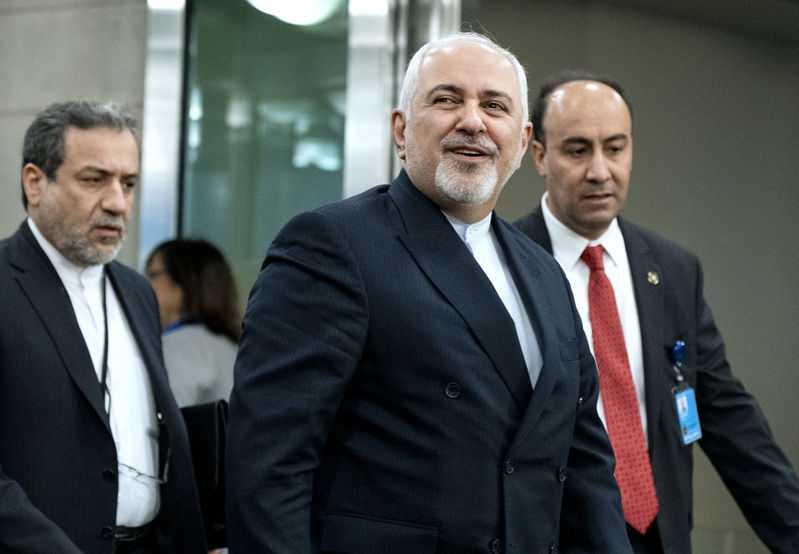Britain, France, Germany blame Iran for Saudi oil attacks
24 September, 2019

Britain, France and Germany joined the United States on Monday in blaming Iran for attacks on key oil facilities in Saudi Arabia, but the Iranian foreign minister pointed to claims of responsibility by Yemeni rebels and said: “If Iran were behind this attack, nothing would have been left of this refinery.”
Fallout from the Sept. 14 attacks is still reverberating as world leaders gather for their annual meeting at the U.N. General Assembly and international experts investigate, at Saudi Arabia’s request, what happened and who was responsible.
The leaders of the United Kingdom, France and Germany released a statement reaffirming their support for the 2015 Iran nuclear deal, which the U.S. exited, but telling Iran to stop breaching it and saying “there is no other plausible explanation” than that “Iran bears responsibility for this attack.”
They pledged to try to ease tensions in the Middle East and urged Iran to “refrain from choosing provocation and escalation.”
British Prime Minister Boris Johnson said late Sunday while flying to New York that the U.K. would consider taking part in a U.S.-led military effort to bolster Saudi Arabia’s defenses after the drone and cruise missile attacks on the world’s largest oil processor and an oil field.
Iran’s foreign minister, Mohammad Javad Zarif, denied any part in the attacks. He said Monday that Yemen’s Houthi rebels, who claimed responsibility, “have every reason to retaliate” for the Saudi-led coalition’s aerial attacks on their country.
He also stressed that on the eve of President Hassan Rouhani’s visit to the United Nations in New York City “it would be stupid for Iran to engage in such activity.”
Zarif called it an attack “with high precision, low impact” and no casualties. In the refinery, there were facilities that would have taken the Saudis a year to repair, he said. “Why did they hit the lowest impact places?” Zarif asked, saying if Iran was responsible, the refinery would have been destroyed.
France has been trying to find a diplomatic solution to U.S.-Iranian tensions, which soared after the Saudi attacks, and has carefully avoided assigning blame.
Earlier on his way to New York, French President Emmanuel Macron said he remained “cautious” about attributing responsibility for the attacks. There was no immediate explanation of why he later shifted positions and blamed Iran.
Macron said at a U.N. news conference not long before the statement was issued that he planned to meet separately with both Trump and Rouhani over the next day and would work to foster “the conditions for discussion” and not escalation.
Macron called the Sept. 14 strikes “a game-changer, clearly” but reiterated France’s willingness to mediate.
Zarif, however, ruled out any Iran-U.S. meeting. He said Iran had received no request from the U.S., “and we have made clear that a request alone will not do the job.”
He said Trump “closed the door to negotiations” with the latest U.S. sanctions, which labeled the country’s central bank a “global terrorist” institution — a designation the Iranian minister said the U.S. president and his successors may not be able to change.
“I know that President Trump did not want to do that. I know he must have been misinformed,” Zarif said in a meeting with U.N. correspondents.
Zarif said he plans to meet Wednesday with ministers of all five countries remaining in the 2015 nuclear deal from which Trump withdrew, including Russia and China.
Johnson, the U.K. prime minister, said Britain still backs the existing nuclear agreement and wants Iran to stick to its terms but urged Trump to strike a new deal with Iran.
“Whatever your objections with the old nuclear deal with Iran, it’s time now to move forward and do a new deal,” he said.
Asked about Johnson’s suggestion, Trump said he respects the British leader and believes the current agreement expires too soon.
The joint U.K., France, Germany statement urges Iran to reverse its rollback on key provisions in the 2015 nuclear deal and calls for a new agreement.
“The time has come for Iran to accept negotiation on a long-term framework for its nuclear program as well as on issues related to regional security, including its missiles program and other means of delivery,” the three countries said.
Source:
